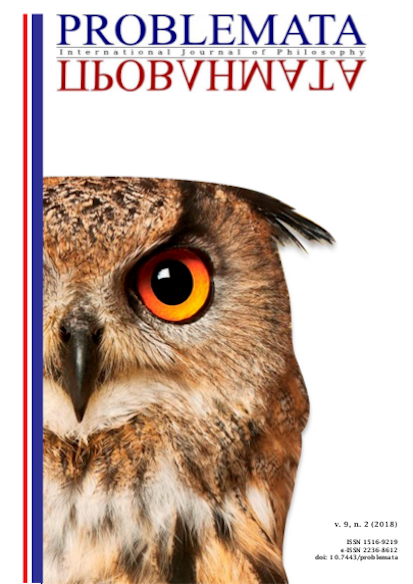THOUGHT AND MENTALISMS IN WITTGENSTEIN’S TRACTATUS
DOI:
https://doi.org/10.7443/problemata.v9i2.37921Keywords:
mentalism, thought, method of projection.Abstract
This paper presents the debate on the attribution of two forms of mentalism to the early Wittgenstein, in the light of the exegetical dispute on propositions 3 and 3.1 of the Tractatus Logico-Philosophicus. The aim of this text is to show that there are serious difficulties both for those who argue that there is at least one form of mentalism present in the Tractatus and for those who reject one or both forms of mentalism.Downloads
References
DIAMOND, Cora. (2005). “Peter Winch on the Tractatus and the Unity of Wittgenstein’s Philosophy”. Em A. Pichler e Saatela eds. p, 133-163.
HACKER, P.M.S. (1999). “Naming, Thinking and Meaning in the Tractatus”. Philosophical Investigations, 22: 119–135.
MALCOLM, N. (1993). Wittgenstein: A Religious Point of View? London: Routledge.
WINCH, Peter. (1987). “Language, Thought and The World. In: Wittgenstein’s Tractatus”. Em Trying to Make Sense. Oxford: Blackwell, 1987, pp3-17.
WITTGENSTEIN, L. (1971). Prototractatus. Routledge & Kegan Paul, London
______. (1993). Tractatus Logico-Philosophicus. Trad. Luiz Henrique Lopes dos Santos. 3ª Ed. São Paulo: Editora da Universidade de São Paulo.
______. (1969). Notebooks 1914-1916. Edited by G. H. von Wright & G. E. M. Anscombe. New York: Harper & Row Publishers
Downloads
Additional Files
Published
Issue
Section
License
Authors who publish with this journal agree to the following terms:
- Authors retain copyright and grant the journal right of first publication with the work simultaneously licensed under a Creative Commons Attribution License that allows others to share the work with an acknowledgement of the work's authorship and initial publication in this journal.
- Authors are able to enter into separate, additional contractual arrangements for the non-exclusive distribution of the journal's published version of the work (e.g., post it to an institutional repository or publish it in a book), with an acknowledgement of its initial publication in this journal.
-
- Authors are permitted and encouraged to post their work online (e.g., in institutional repositories or on their website) prior to and during the submission process, as it can lead to productive exchanges, as well as earlier and greater citation of published work (See The Effect of Open Access).





